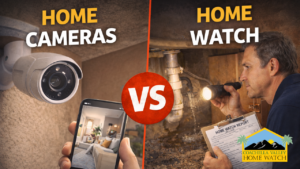
Leaving your desert home for weeks or months at a time can create a lingering sense of uncertainty, even when everything appears secure from the outside. A locked door and a functioning camera offer comfort, but they don’t reveal what’s happening inside the home itself. In the desert climate, small issues rarely stay small. A clogged condensation line, a struggling A/C system, a slow leak beneath a sink, or the first hint of mold can all begin quietly and escalate long before anyone notices.

Being far away naturally magnifies these concerns. It’s not just about keeping intruders out; it’s about knowing the systems within your home are holding up against temperatures that regularly climb into triple digits. It’s about returning to a home that feels exactly as you left it, instead of discovering damage that grew unnoticed in your absence.
The more time people spend away from their desert homes, the more important it becomes to understand the risks that develop silently — and how to prevent them.
Attention to Detail: The First Line of Protection
In hot, dry environments, the “big problems” almost always start with subtle, easy-to-miss signs. An unusual smell, a faint water stain, a room that feels warmer than it should, or plants showing early stress often indicate underlying issues. Cameras and sensors don’t always detect these soft warnings. They can’t hear a strange sound from the HVAC system, sense humidity changes, or notice dust pushing in through weather stripping after a windstorm.
This is where intentional, detail-oriented observation makes the difference. A person walking through your home can spot the earliest hint of trouble long before it turns into a costly repair. They can see if an irrigation zone is failing, if a breaker has tripped, or if something simply feels “off” inside the home. These are the types of clues that only appear when someone is physically present, paying attention to all the small shifts technology can’t interpret.
Understanding the desert’s unique challenges is essential. Extreme heat places enormous strain on HVAC systems. Hard water leads to buildup that affects plumbing, appliances, and irrigation. Dust and wind can infiltrate homes even when everything is closed properly. Someone familiar with these conditions knows what to look for, when problems commonly arise, and how early symptoms typically appear. This is why you want to have Accredited Home Watch Service look out for your home while you’re away.
Seeing Preventive Care as a Long-Term Investment

It’s easy to underestimate how quickly damage develops when a home sits empty. A minor leak can become a major insurance claim. A failing air conditioner during a heatwave can lead to warped floors, damaged furniture, and mold growth. An irrigation failure can kill landscaping in a matter of days. These issues don’t wait for homeowners to return — they worsen silently.
This is why regular oversight should be viewed as an investment rather than an optional expense. Consistent check-ins protect the long-term health of the property and dramatically reduce the chances of expensive repairs later. Most homeowners who have experienced an unnoticed issue once never want to repeat it. They recognize that the cost of preventive care is small compared to the cost of recovering from a failure that went undetected for weeks.
Read more here about 7 Problems Only a Home Watch Professional Will Catch
When you know your home is monitored with care and attention, you gain more than protection — you gain confidence. You can live, travel, and enjoy your time away without carrying quiet worry in the back of your mind. You return to a home that feels just the way you left it, safe, clean, and functioning exactly as it should.
Frequently Asked Questions
Q: Why isn’t technology enough to protect a vacant home?
A: Technology can alert you to some issues, but it doesn’t replace human observation. Cameras and sensors miss early signs of leaks, electrical problems, humidity changes, failing appliances, and other subtle indicators.
Q:How often should a home be checked when no one is living in it?
A: Desert homes typically benefit from weekly or biweekly check-ins, especially during the hottest months when heat puts extra pressure on air-conditioning, plumbing, and irrigation systems.
Q:What types of problems usually develop while a home is empty?
A: The most common issues include HVAC failures, irrigation breakdowns, leaks, mold, pest activity, and storm-related damage. These often begin mildly and worsen over time when unchecked.
If you’d like practical guidance or support in keeping your desert home protected while you’re away, call us.







No comment yet, add your voice below!